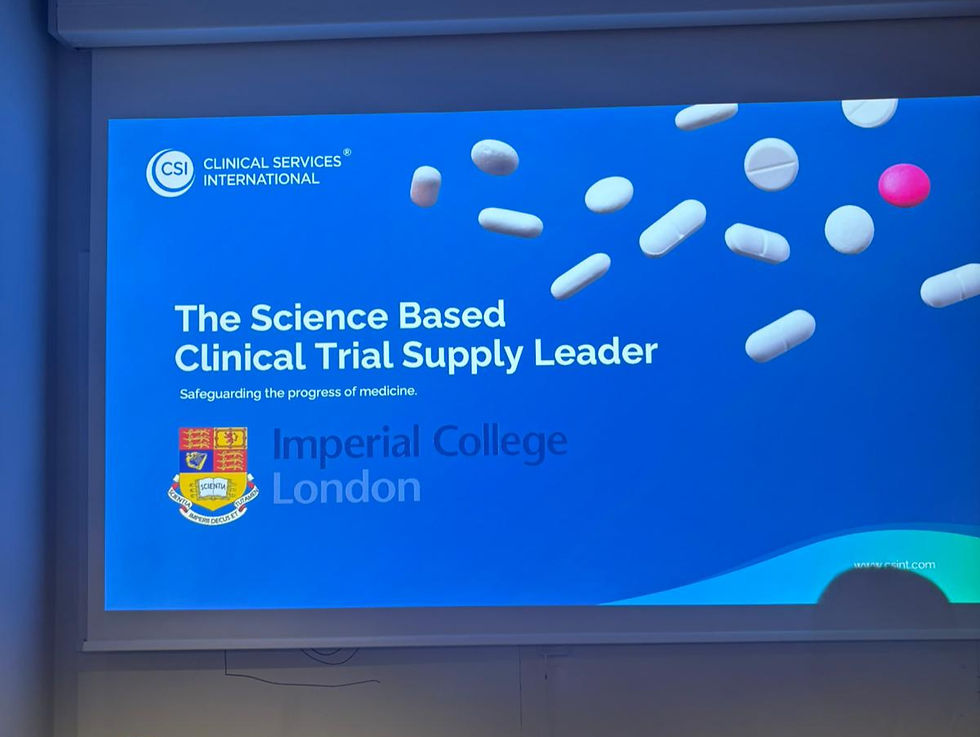Ensuring Quality and Reliability: The Importance of Clinical Trial Comparator Sourcing
- Clinical Services International (CSI)

- Oct 11, 2023
- 2 min read
Updated: Feb 5, 2024

Clinical trials are the backbone of medical research, serving as a critical step in evaluating the safety and efficacy of new drugs and treatments. A key element of conducting successful clinical trials is the careful selection and sourcing of comparator drugs. Comparators, also known as reference drugs, play a vital role in comparing the effects of the investigational drug to an established standard of care. We explore the significance of clinical trial comparator sourcing, highlighting the importance of quality, reliability, and adherence to regulatory standards in this crucial aspect of the drug development process.
Importance of Comparator Sourcing:
Ensuring Validity of Trial Results: The choice of an appropriate comparator is essential to draw accurate conclusions from clinical trials. A well-selected comparator should have similar pharmacological properties and indications as the investigational drug, allowing for a fair comparison of their effects. Without a reliable comparator, the results of the trial may be compromised, rendering the study inconclusive or misleading.
Safety and Ethics: Patient safety is paramount in any clinical trial. High-quality comparator drugs sourced from reputable and audited suppliers reduce the risk of adverse events and ensure that trial participants are provided safe and consistent medications. Ethical considerations mandate that the comparator drugs used have all been quality-certified, as the well-being of patients should never be compromised.
Regulatory Compliance: Stringent regulatory requirements govern clinical trials to safeguard participants and maintain the integrity of scientific research. Comparator sourcing must adhere to Good Manufacturing Practices (GMP), Good Distribution Practices (GDP) and meet regulatory standards in all regions where the trial is conducted. Failing to meet these requirements could lead to delays in trial approval or even trial termination.
Challenges in Comparator Sourcing:
Supply Chain Complexity: Clinical trial comparator sourcing involves complex supply chains that span different countries and regions. Managing logistics, safeguarding product integrity during transportation, and ensuring timely delivery present significant challenges for trial sponsors.
Quality Assurance: The variation in the quality of comparator drugs sourced from different suppliers is a significant concern. Implementing robust quality control measures, including supplier qualification, auditing, and proper documentation, is essential to guarantee the reliability and consistency of the comparators sourced.
Regulatory Variations: Each country and regions have their own specific regulatory requirements for clinical trial comparator sourcing. Understanding and complying with these diverse regulations necessitate a comprehensive understanding of the local and regional regulatory landscape.
Best Practices in Comparator Sourcing:
Thorough Supplier Qualification: Working with audited and reputable suppliers ensures the reliability and quality of the comparator drugs. Comprehensive supplier qualification processes should be in place, including audits, compliance checks, and adherence to GMP.
Continuous Quality Oversight: Establishing a dedicated quality department to oversee comparator sourcing ensures ongoing compliance with quality standards and regulatory requirements throughout the trial.
The sourcing of clinical trial comparators is a pivotal step in conducting successful and ethical clinical research. Ensuring the highest quality, safety, and regulatory compliance of comparator drugs is paramount to the validity of trial results and the protection of trial participants. By embracing best practices in comparator sourcing and addressing the challenges involved, the pharmaceutical industry can continue to drive medical advancements and improve patient outcomes.




.png)
Comments